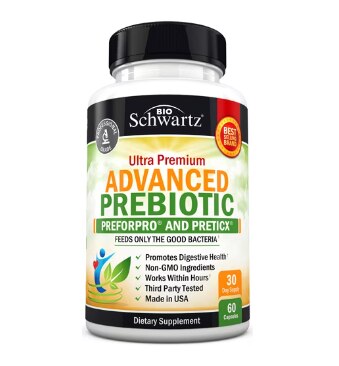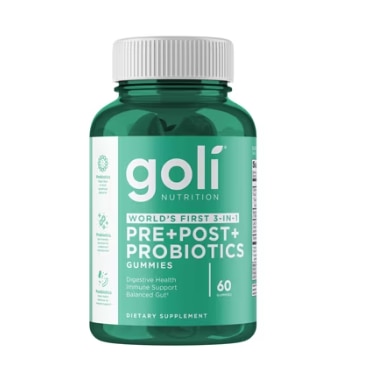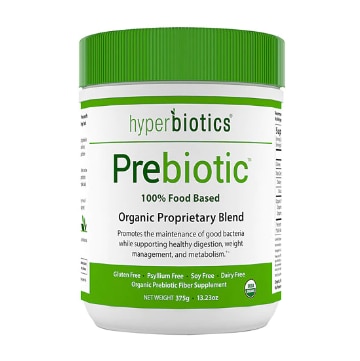Probiotics get a lot of attention, but they wouldn’t be gut health powerhouses without the prebiotics they feed on or the postbiotics they produce. Together, prebiotics, probiotics and postbiotics keep your gut strong and balanced.
But what’s the difference between prebiotic vs postbiotic? Each has a distinct purpose and function that can support a robust gut microbiome and prevent common gut ailments.
Prebiotic vs postbiotic: What’s the difference?
The most fundamental difference between prebiotics and postbiotics is function. Prebiotics kick off the process of improving gut health; postbiotics promote processes that influence functions in the gut and throughout the body.
Prebiotics: Definition and function
The International Scientific Association for Probiotics and Prebiotics (ISAPP) defines a prebiotic as:
“… a substrate that is selectively utilized by host microorganisms conferring a health benefit.”
In simpler terms, a prebiotic is any substance that groups of microbes in a system like your gut can act on to create changes that support your health.†
Prebiotics that influence gut health generally come from the foods you eat and include†:
- Fructooligosaccharides (FOS)
- Galactooligosaccharides (GOS)
- Soluble fibers like inulin
Your gut bacteria break these down compounds through a process called fermentation, which feeds your microbiome and promotes populations of beneficial bacteria. When the microbes feed, they secrete postbiotics as byproducts of fermentation.
Postbiotics: What they are and benefits
Postbiotics are relatively new on the scene in gut health science and got their own ISAPP definition in 2019:
“… a preparation of inanimate microorganisms and/or their components that confers a health benefit on the host.”
These “inanimate microorganisms” can include entire cells, fragments like cell walls and products of cell breakdown or metabolism. Short-chain fatty acids (SCFAs) are the most well-known products, but gut microbes can also make:
- Vitamins
- Organic acids
- Proteins and peptides
- Neurotransmitters
- Bacteriocins
- Byproducts derived from antioxidants
Some postbiotics contain cells from common probiotic genera like Lactobacillus and Bifidobacteria, and scientists continue to research potential postbiotic benefits of other bacterial and fungal strains.
What do prebiotics and postbiotics do?
Prebiotic vs probiotic compounds have specific jobs in your body. Each is part of a complex process that starts when you eat or supplement with prebiotics and continues as probiotic microbes in your gut feed on your latest meal and pump out postbiotics that can positively influence your health.
Prebiotic benefits
According to current scientific evidence, consuming or supplementing with prebiotics may help†:
- Relieve IBS symptoms†
- Support GI motility and bowel regularity†
- Support immune system function and response†
- Assist in recovery from illness†
- Support healthy inflammatory responses†
- Support healthy cognitive function†
- Support memory and cognitive health†
- Help maintain a healthy mood†
Postbiotics for gut health
But many of the benefits attributed to prebiotics may actually result from postbiotic production and activity. The authors of a a 2021 article published in Nature cite five areas of gut health where more research on postbiotics may be helpful†:
- Gut microbiome composition. A healthy balance of beneficial microbes helps control pathogens and supports a strong gut barrier. Some types of postbiotics called bacteriocins may help maintain this balance.†
- Gut barrier function. Compounds like lipopolysaccharides, a type of lipid attached to carbohydrates, can cause inflammation that disrupts the gut barrier and loosens the junctions between gut cells. Tight junctions are necessary to keep gut contents out of your bloodstream, where your immune system may mistake food molecules for pathogens. Postbiotics might support healthy barrier function and maintain a strong gut.†
- Gut-modulated immunity. Immune cells produce pro- or anti-inflammatory compounds in response to signals sent through receptors on cell surfaces. Interactions between postbiotics and these receptors may support healthy immune responses in your gut and beyond.†
- Metabolic activity. Problems with how your body metabolizes glucose and fats can affect metabolic health and blood sugar regulation. Some postbiotic compounds might help maintain appropriate blood sugar levels; others may be beneficial for healthy weight management.†
- Nervous system communication. Neurotransmitter precursors produced by gut bacteria can travel to your brain and interact with receptors that promote cognitive function. Some postbiotics may promote brain health through nerve signals that support neurotransmitter production in the gut or directly affect the brain.†
If these benefits can be demonstrated in more human studies, postbiotic compounds could show promise for promoting healthy function in the gut and other systems throughout the body.†
What are the best postbiotics foods?
Since study data on postbiotics and gut health in people is limited, postbiotics supplements aren’t yet widely available. Fermented foods like pickled vegetables, kombucha and yogurt may contain postbiotics produced during fermentation, but research isn’t clear as to whether levels are high enough to affect your gut microbiome.
The best postbiotics “supplements” are actually the prebiotics that feed your gut microbes. Prebiotic foods and fibers can boost populations of beneficial probiotic bacteria in your microbiome, so you have more tiny postbiotic factories ready to get to work!
Prebiotic foods to eat for postbiotics
To fuel postbiotic production in your gut, start incorporating these prebiotic foods into your diet:
- Raw or cooked vegetables and fruits
- Whole, intact grains like oats, barley and rye
- Cooked and cooled baked potatoes or whole-grain pasta
- Legumes like beans, peas, split peas and lentils
Some foods have more prebiotic power than others. Apples, asparagus, Jerusalem artichokes, onions, seaweed and sweet potatoes are just a few options to supercharge postbiotic production.
Prebiotic supplements can increase postbiotics and benefit gut health, too. If you choose to add these to your gut health regimen, follow the dosing instructions carefully. Taking too much prebiotic fiber can cause digestive symptoms like bloating, gas, or constipation. Increase your intake from food or supplements slowly to reduce the risk of side effects.
†These statements have not been approved by the Food and Drug Administration. These products are not intended to diagnose, treat, cure or prevent disease.




